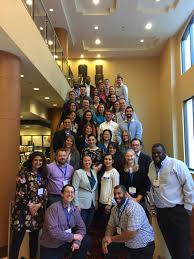
“Management is doing things right; leadership is doing the right things.”– Peter Drucker
Have the feeling you’ve seen this quote before? Since you’re reading this post, chances are good you have; for example, you’ll find it in the February 14 2019 LOTRW post, and perhaps one or two more; it’s also in LOTRW-the-book.
Why the emphasis? Because even with more than seven billion people, today’s world suffers from a shortage of leaders. In a way that’s to be expected. Most of us report to someone higher-up, and are rewarded for doing things right– that is, as defined by that higher-up. Very few are in positions where they’re rewarded for doing the right things – which can usually be identified only by absorbing a diverse range of outside perspectives, accompanied by a deep process of reflection.
But here’s the stern reality. It’s a mistake to think complacently like a manager on your climb up the employment ladder, with the notion that once you reach the top, you’ll flip a switch and from then on think like a leader. Doesn’t work that way. By the time you get “there,” (and “there” is almost always another step away), thinking like a manager will be ingrained, and you’ll discover you have very little countervailing experience thinking like a leader. It’ll be too late.
So it’s not too early to start. Most fundamentally, while still in a managerial or subservient role, you have to add an overlay to your thought process: if I owned the company, or ran the agency, or led the university, what would I do?
Easier said than done! So to jump start the process, you should be seizing leadership development opportunities every chance you get.
Here’s good news. There’s one right under your nose, and the timing is perfect. It’s the AMS Early Career Development Academy, just now seeking applicants for its second cohort. (The deadline for applications is March 8.) The website supplies full information; here’s an excerpt:
With support provided by IBM, the American Meteorological Society’s (AMS) Early Career Leadership Academy (ECLA) aims to build and sustain a diverse network of early career leaders in weather, water, and climate science. ECLA will bring together a select group of early career individuals—in particular, women and underrepresented minorities—for an immersion experience in leadership, such as creative problem-solving, conflict resolution, building trust, and enhancing communication skills. We seek early career individuals from a wide range of professions, interests, perspectives, cultures, and experiences.
You know you want to do this.
Don’t believe that you should start now? Feeling pressed for time and tempted to wait until next year? Perhaps these two examples will change your mind.
The February 9thprint editionof The Economistcontains an article about an upcoming election in Nigeria. The reporter documents reasons for skepticism about prospects for good governance or improved living conditions under either Mr. Buhari, the incumbent seeking reelection, or his challenger, Mr. Abubakar (both men are in their 70’s). But the reporter closes with this:
Four times Mr Buhari has blocked reforms that would strengthen Nigeria’s electoral commission. Such intransigence frustrates Samson Itodo, a founder of the “Not too young to run” campaign, which is trying to clean up elections and make political involvement easier for the three-quarters of Nigerians who are under 35. “We are tired of these same old leaders,” he says. “We are laying the foundation for a revolution in 2023.” Until then, Nigeria will be stuck with mediocrity.
Not too young to run? What a great name for a political party. But perhaps Mr. Itodo needn’t have waited so long…
Consider thirteen-year-oldAlexandria Villasenor and this article from Tuesday’s Washington Post, entitled How a 7th-grader’s strike against climate change exploded into a movement. It begins this way:
NEW YORK — On the ninth Friday of her strike, 13-year-old Alexandria Villasenor wakes to a dozen emails, scores of Twitter notifications and good news from the other side of the planet: Students in China want to join her movement.
Every week since December, the seventh-grader has made a pilgrimage to the United Nations’ headquarters demanding action on climate change. She is one of a cadre of young, fierce and mostly female activists behind the School Strike 4 Climate movement. On March 15, with the support of some of the world’s biggest environmental groups, tens of thousands of kids in at least two dozen countries and nearly 30 U.S. states plan to skip school to protest.
Surely that draws you in. Sarah Kaplan’s full article on Alexandria merits your careful reading. Ms. Kaplan ends it this way:
His presentation done, de Menocal hands the clicker over and Alexandria straightens in her chair. “Okay,” she says. “Here’s the update.”
The professor leans forward as the 13-year-old launches into a description of the global strike — all the support it has, all the attention it has received. In 30 years of studying climate, in all his uncountable hours of attempting to convey the scope of the crisis, he has rarely felt so humbled, he says — or so filled with hope.
“Do you have a statement I can read somewhere?” he asks.
“Sure,” Alexandria says. “We have a mission statement and a media advisory on our website.”
De Menocal mouths “wow” and turns around to give the girl’s mother an amazed grin. Afterward, he pulls Alexandria aside.
“Thank you for what you’re doing,” he says, shaking her hand. “Thank you so much. What can I do to help?”
She tells him about the scientists who are writing a letter of support and suggests that he get involved.
“He can organize the adults,” she says later. “We’re ready for them now.” [Emphasis added.]
Want to come alongside Mr. Itodo and Ms. Villasenor? Apply for the 2019 ECLA. Dial up your leadership mojo.


Managers plan; leaders dream. We need both – one to point to the future and the other to get us there.